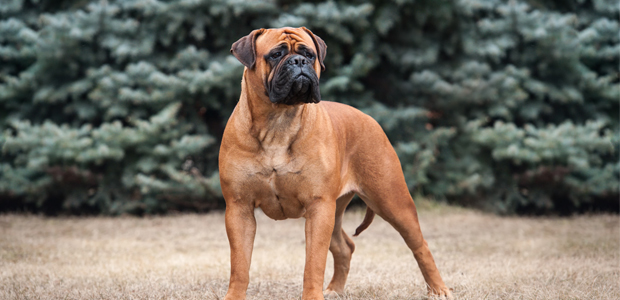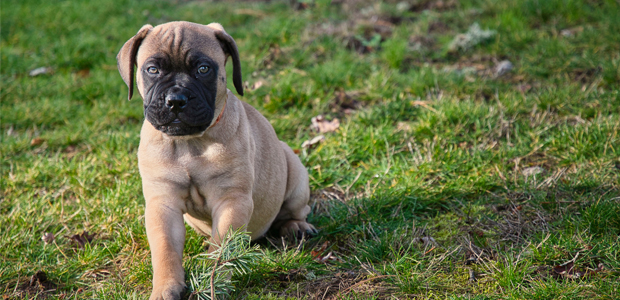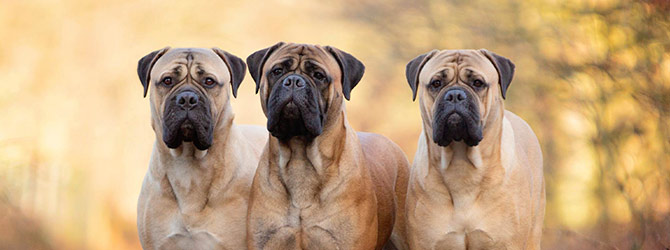Bullmastiff: is it the right dog for you?
Bullmastiffs are large and loyal dogs who have a reputation as gentle giants. These big softies love to spend quality time with their family, although they can be wary of strangers so early socialisation is key.
Originally bred as guard dogs, Bullmastiffs are powerful and intelligent dogs that need lots of exercise and mental stimulation to keep them happy and healthy.
Bullmastiff summary:
- Originally bred as guard dogs
- Bullmastiff life expectancy 10 years
- Average size is 60 - 68 cm
- Average weight is 30 - 50 kgs
- Coat is short and dense
- Common colours include fawn and red
- Estimated monthly cost = High
- Exercise needs = High
- Attention needs = Medium
- Sociability = Medium
Please note: A dog’s exercise, training/stimulation and grooming requirements can depend on several factors such as age and health. The same goes for ongoing costs of ownership. For advice on one specific dog, we always advise chatting with a vet.
How much exercise do Bullmastiffs need?
Bullmastiffs are a very active breed and will need around 2 hours of exercise per day. They’ve got a lot of energy and will benefit from multiple walks a day. A shorter one in the morning is fine but make sure that they can have a nice long walk later in the day.
To keep them happy and healthy, take them to a secure environment where they can run off-lead, with lots of interesting things to see and sniff.
We advise walking them during cooler times of the day and having plenty of water handy, as Bullmastiffs can struggle in the heat.

Bullmastiff temperament, socialising and ideal home environment
Bullmastiffs are loyal, family-loving dogs with a strong protective instinct that makes them popular guard dogs. Their personality may differ depending on their background and other factors, but this is the case for most breeds.
They don’t tend to be noisy dogs and can adapt well to apartment living, provided you are close to green space due to their high energy levels. If their physical and mental stimulation needs aren’t met, they’ve been known to engage in destructive behaviour.
Because of their size, they might not make the best pet if you have young children, due to the risk of knocking them over. As with all breeds, especially large powerful ones such as Bullmastiffs, it’s recommended that children are supervised when playing with dogs.
Whilst they are still young and receptive, it's a good idea to introduce your Bullmastiff to other dogs, people and livestock, as well as car travel and unfamiliar noises, such as traffic.
Training: how to train a Bullmastiff
Training a Bullmastiff will often require the patience and understanding of an experienced owner. They don’t respond well to heavy-handed treatment or scolding, instead preferring positive reinforcement, praise and plenty of treats.
Due to their size and strength, Bullmastiffs require socialisation training as it’s vital that they learn how to behave around other dogs and unfamiliar people. As long as your Bullmastiff is well trained, they’ll get on well with children and other pets, becoming loving and loyal members of the family.
As is the case with all breeds, Bullmastiffs will start to approach new experiences with caution when they are around 12 weeks old. Therefore it’s really important for their development that they experience as many different situations as possible.
Grooming: do Bullmastiffs shed?
Bullmastiffs are low maintenance when it comes to grooming. Thanks to their short, dense coat, a quick brush once a week will suffice. You should only need to bathe your Bullmastiff when they get muddy.
Complete your Bullmastiffs grooming routine with regular tooth brushing, nail clips and ear checks.
Cost of owning a Bullmastiff
When considering the lifetime cost of owning a Bullmastiff, remember to take into account the following costs:
- Breed-specific food
- Veterinary care
- Pet insurance
- Kennels or dog sitters
- Grooming costs
- Toys and equipment
- Preventative healthcare
As a rough guide, allow between £100 and £150 a month to cover the ongoing costs of owning a Bullmastiff. Our vets have drawn up this handy guide to save dog owners money.

Are Bullmastiffs prone to any health problems?
Bullmastiffs are prone to certain health problems, just like all breeds. This doesn’t mean your dog is guaranteed to contract any particular disease – it’s just something to bear in mind.
As brachycephalic dogs, Bullmastiffs are on average more susceptible to a range of health problems than other breeds. In particular, they may require surgery to open up their airways and improve their breathing. For more information on brachycephalic breeds, contact your vet.
To keep your Bullmastiff as healthy as possible, monitor them closely and attend routine 6-monthly health checks with your vet. This will allow the vet to give your dog a thorough check-up and to pick up on minor (often symptomless) conditions before they have a chance to escalate into something worse.
Possible health complications for Bullmastiffs include:
- Breathing issues associated with brachycephaly
- Dental disease
- Infections
- Canine obesity
- Allergies
- Eye problems
- Mange in dogs
- Hypothyroidism
Before welcoming a new dog into your household, make sure you’re able to cover the costs of any routine or emergency medical treatment they may need. Pet insurance will help massively with this. Why not ask your vet about their recommended pet insurance policy?
Read more: Canine brachycephaly: breathing problems in brachycephalic dogs.
Bullmastiff dietary requirements
Your Bullmastiff will need a balanced diet that’s rich in nutrients, vitamins and minerals. It’s best to feed them complete dog food specially formulated for large breeds to ensure that they are getting the right amounts of vitamins and nutrients.
Growing pups may prefer 3-4 smaller servings during the day, rather than two larger meals. This can be reduced to two meals a day as your dog gets older.
The recommended portion size will depend on your individual dog. You’ll need to take into account their activity level, age and metabolism. To avoid weight gain, make sure your Bullmastiff has a healthy and balanced diet and gets plenty of exercise.
For dietary advice that’s specific to your dog, have a chat with your local vet or the breeder you’re purchasing your puppy from.
Are Bullmastiffs suitable for first-time owners?
A Bullmastiff may not be the easiest companion, especially if you’re a first-time pet owner. They’re very intelligent and physically powerful dogs, that can quickly become a handful if they’re not properly stimulated and socialised.
That said, if you lead an active outdoor lifestyle and are prepared to put in the hours when it comes to training, there’s no reason for a Bullmastiff not to be your ideal pet. If you
have done your research beforehand, owning a Bullmastiff can be an enjoyable and rewarding experience.
Need more info?
For more info on finding the best dog breed for you and your lifestyle, have a chat with your vet.
Find your nearest vet using our Find a Vet page, or speak to a vet online using Online Vets.

